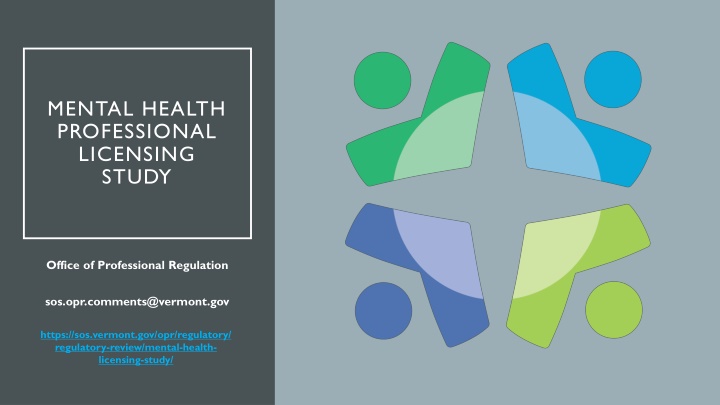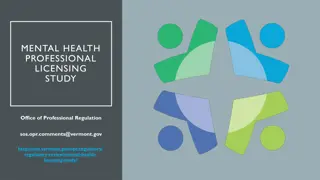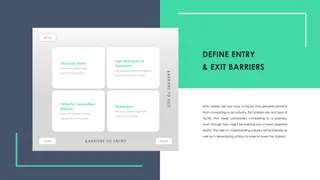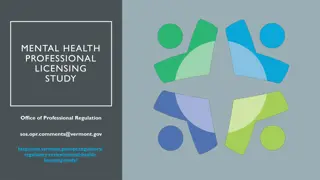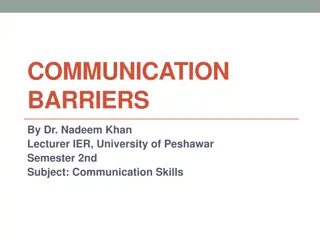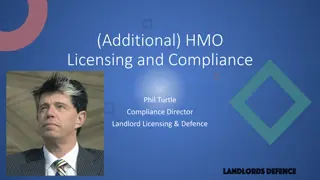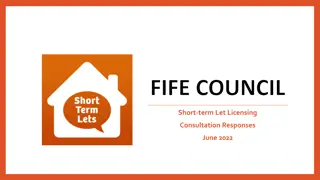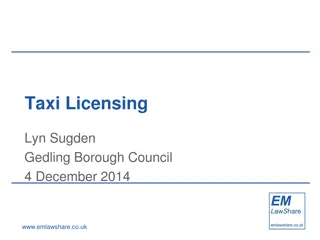Improving Mental Health Professional Licensing: Addressing Barriers and Enhancing Equitability
Exploring challenges in mental health professional licensing, this study identifies barriers such as access, cost, supervision, and systemic inequalities. It aims to enhance equity, streamline processes, and improve post-degree requirements for professionals-in-training. Collaborative efforts with partners are key to addressing regulatory inconsistencies and supporting out-of-state professionals.
Download Presentation

Please find below an Image/Link to download the presentation.
The content on the website is provided AS IS for your information and personal use only. It may not be sold, licensed, or shared on other websites without obtaining consent from the author.If you encounter any issues during the download, it is possible that the publisher has removed the file from their server.
You are allowed to download the files provided on this website for personal or commercial use, subject to the condition that they are used lawfully. All files are the property of their respective owners.
The content on the website is provided AS IS for your information and personal use only. It may not be sold, licensed, or shared on other websites without obtaining consent from the author.
E N D
Presentation Transcript
MENTAL HEALTH PROFESSIONAL LICENSING STUDY Office of Professional Regulation sos.opr.comments@vermont.gov https://sos.vermont.gov/opr/regulatory/ regulatory-review/mental-health- licensing-study/
AGENDA Welcome New and Refined Issues and Questions Throughout Identifying Resources, Research, and Learning Opportunities
We're here! Questions and Goals and Scope Research, Resources, and Learning Report Recommendations
BARRIERS TO ENTRY Examinations (need for accommodations and alternatives) Lack of guidance on how to pursue licensure (e.g., website problems, inaccessible language and resources) Pathways to licensure (need to simplify and expand, particularly for those out-of-state) Specificity of the current requirements (e.g.,1:30 ratio of supervision to supervised practice) "Threshold" qualifications and post-degree supplementation Continuing education requirements across all professions (equity,cost, time, need, consistency, etc.) Confusing qualifications (e.g., "psychotherapy" and social work; direct vs. indirect supervision) Multiple boards and regulatory requirements for professions with similar but different practices Lack of qualified supervisors Cost and payment structure for supervision Disconnect between licensing and reimbursement (time after licensure to credentialing, roster timeline,etc.) Licensing requirements inconsistent with those of surrounding states Clarity of process for obtaining VT license based on license in another state Access and barriers to obtaining required education (financial, time, location, etc.) Clarity of process for obtaining a telehealth license or a compact license No license for disciplines (e.g., art therapy, music therapy, school counseling) No regulation of supervisors The Roster, its role, timing requirements, and impact of both (e.g., public protection, ability to obtain license,counting of supervision hours,reciprocity) No way to confirm supervision is compliant until finished
BARRIERS SUBGROUP QUESTIONS How can we be more equitable in mental health professional licensing? Continuing education, access to education, cost and access to relevant supervision Systemic oppression and inequality in barriers to entry How can the laws be improved for professionals-in-training? The Roster Affordability, access, non-monetary costs Exams, supervision hours, coursework Guidance, clarity How do we improve the post-degree supervised practice and supervision requirements? Address equity, cost, oversight, etc. Maintain availability How do we work with partners to ensure coordination with other practice needs (e.g., reimbursement)? How do we address barriers to licensure for other disciplines and out-of-state professionals?
RESEARCH & RESOURCES What resources would be helpful to answer these subgroup questions? What stakeholder groups should be considered and how can we include their participation? What can Vermont learn from other states regulatory programs? What other research would you like OPR to conduct? What other research and resources does this group have available?
NEXT MEETING DATES Meetings: 2-4pm Supervision Dec. 5 Streamlining & Barriers Dec. 12 Whole Group Meeting Dec. 18 Sos.opr.comments@vermont.gov
